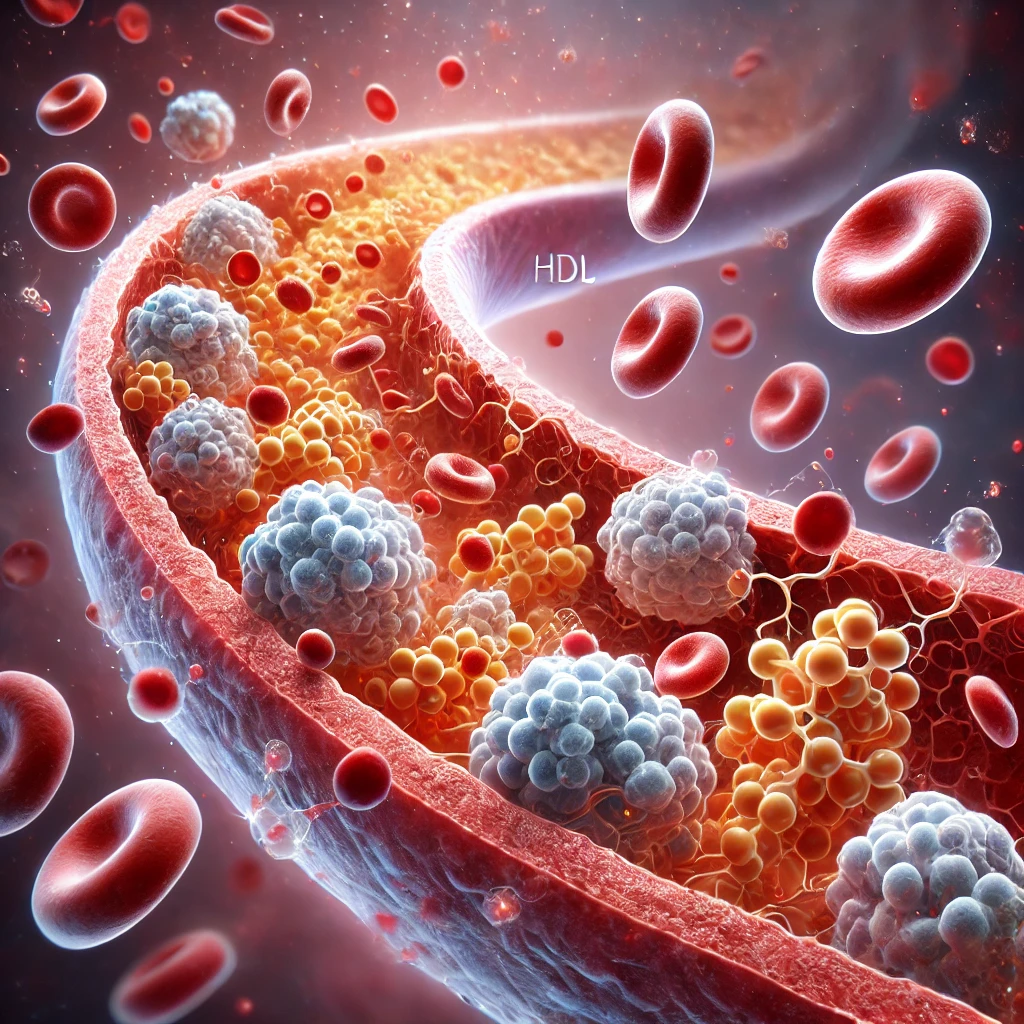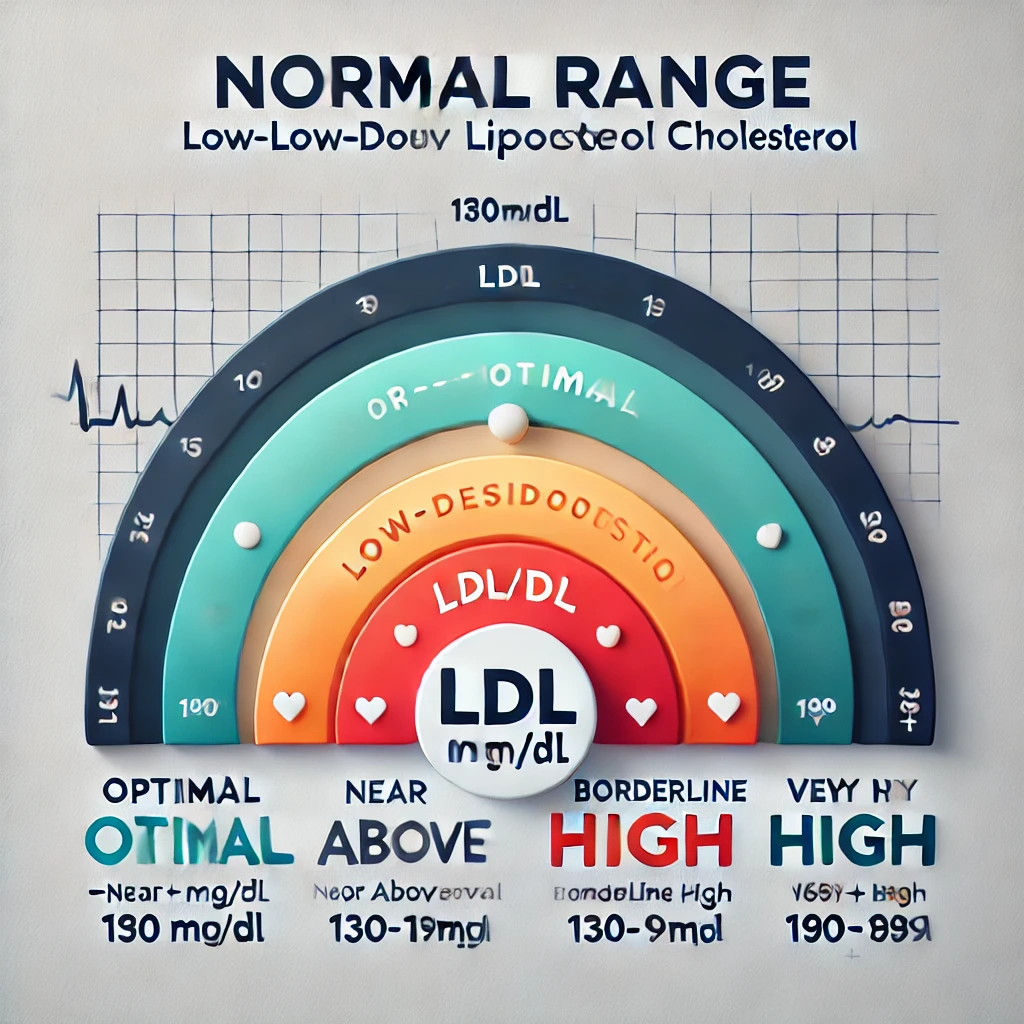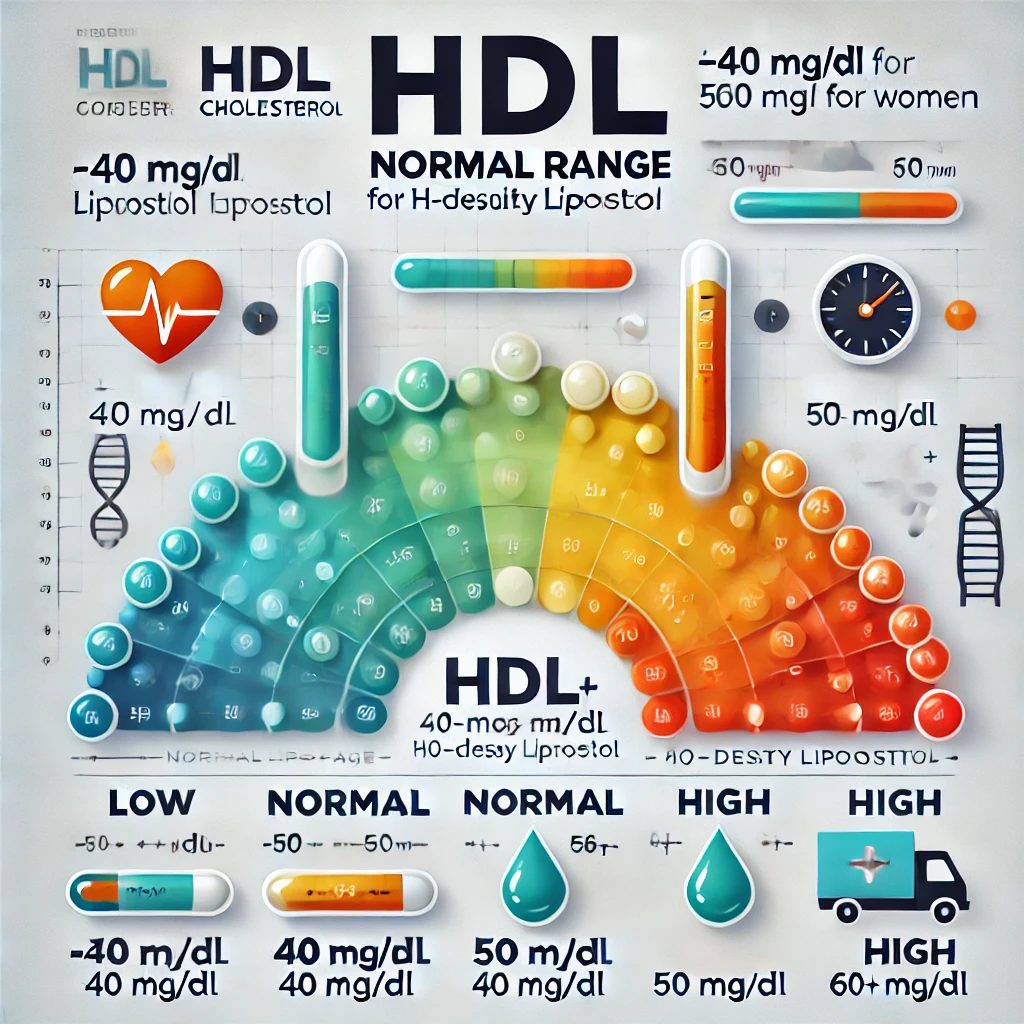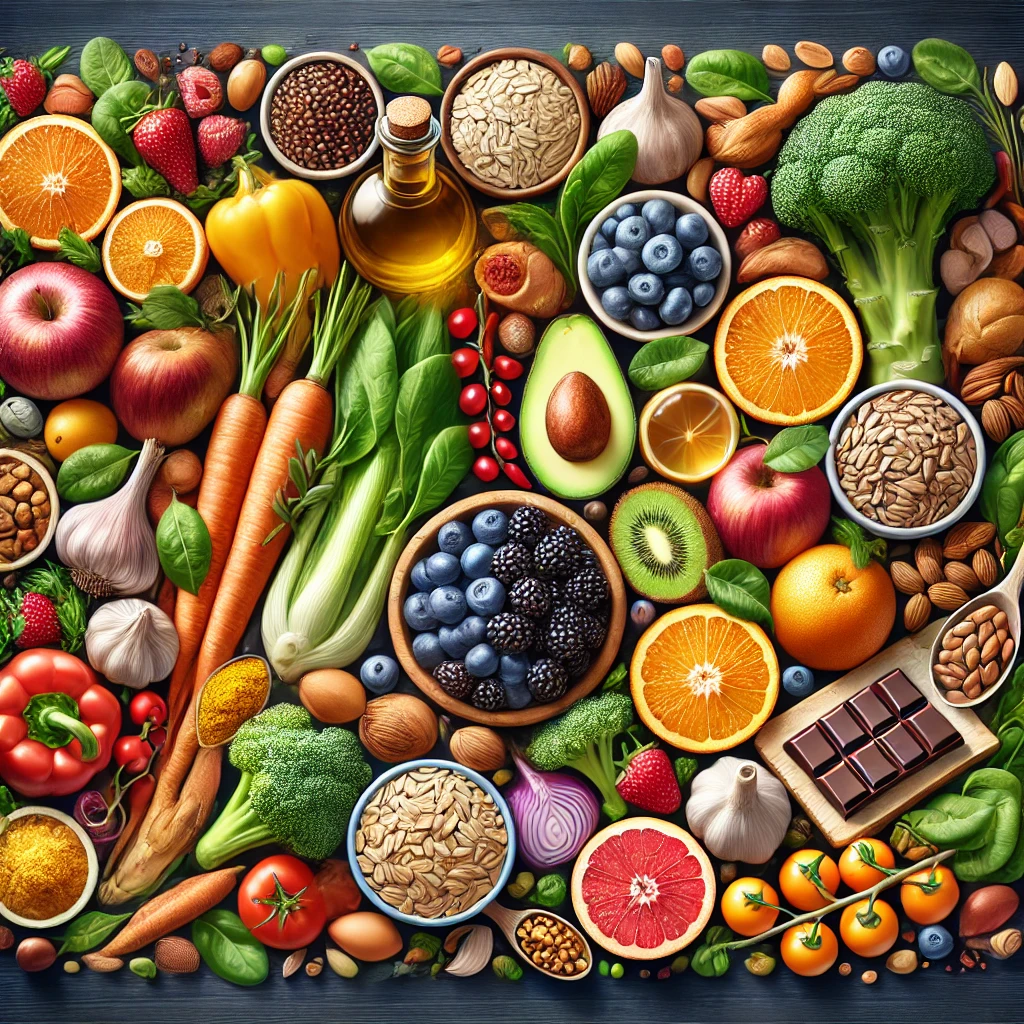Last Updated on August 24, 2025 by Irshad Quadri

Heart health has become a major concern these days, and understanding cholesterol levels is an important part of it. Many people get confused about what normal cholesterol levels are and how they can be maintained. If you are also confused about your LDL and HDL cholesterol normal range, then this article is for you!
According to the American Heart Association, over 94 million adults in the U.S. have high cholesterol.
What is Cholesterol?
Cholesterol is a waxy, fat-like substance that is made by our liver and also obtained from some foods. It is important for our cells, but when its level increases, the risk of heart diseases also increases. Therefore, maintaining your cholesterol levels is very important for heart health.

Table of Contents
What are normal cholesterol levels?
According to the American Heart Association (AHA), normal cholesterol levels for healthy adults are as follows:
| Cholesterol Type | Normal Range (mg/dL) |
| Total Cholesterol | Below 200 |
| LDL (Bad Cholesterol) | Below 100 |
| HDL (Good Cholesterol) | 40-60 (Higher is better) |
| Triglycerides | Below 150 |
LDL Cholesterol Normal Range

LDL (Low-Density Lipoprotein) is called “bad cholesterol” because it gets deposited in arteries and increases the risk of heart attack. Normal range should be less than 100 mg/dL. But if you are a heart patient then it is better to maintain less than 70 mg/dL.
HDL Cholesterol Normal Range

HDL (High-Density Lipoprotein) is the “good cholesterol” that removes LDL from the artery and takes it to the liver, where it breaks down. HDL less than 40 mg/dL is a risk factor, while 60 mg/dL or more is protective for the heart.
Balance between LDL and HDL
It is important to maintain a balance between LDL and HDL. LDL should be below 100 mg/dL, and if you are a high-risk patient, then less than 70 mg/dL is best.
How to Read Your Cholesterol Test Report (Without Panic!)
So you got your lipid panel results. Awesome! Let’s decode those numbers together. Think of them as your heart’s report card.
Meet the Cholesterol Crew
Your lipid profile measures four key players. Knowing them is the first step to heart health.
Total Cholesterol: The Big Picture
This is the sum of all the cholesterol in your blood. That’s a general overview. But the details are more important!
LDL (Low-Density Lipoprotein): The Bad Cholesterol
This is the “bad” cholesterol. It’s sticky and likes to stick to artery walls. You want this number low.
HDL (High-Density Lipoprotein): The Hero
This is the “good” cholesterol! It acts like a cleanup crew. It sweeps away the bad stuff. Here’s the good news.
Triglycerides: The Troublesome Fat
These are the most common fats in your body. They store energy. But high levels can be dangerous for your heart.
Your Quick Guide: The Numbers Decoded
Don’t just scan your report. Understand! Here’s a simple cheat sheet.
If your report says this → What it means
Total cholesterol: <200 mg/dL You’re in the desirable range! Gold star.
LDL (‘bad’ cholesterol): <100 mg/dL Excellent! “Bad” cholesterol is under control.
HDL (‘good’ cholesterol): ≥60 mg/dL Excellent! Your “hero” is doing great.
Triglycerides: <150 mg/dL Perfect! That troublesome fat is under control.
See a number outside this range? Don’t panic just yet. Many factors influence these results.
Your action plan: What to do next
Knowledge is power. Now, let’s use it. Here are your next steps.
First, take a deep breath. A test is a snapshot, not your entire life story. Fluctuations are completely normal.
Schedule a chat with your doctor. They will interpret your results in context. They know your entire health history.
Ask your doctor smart questions. Be prepared! Here are some great starters for your visit:
“What do these numbers mean for my personal heart disease risk?”
“Which specific number should we focus on improving first?”
“Do I need medication, or can we try lifestyle changes?”
“When should I come back for a follow-up test?”
Your doctor loves these questions. They show you’re engaged in your health journey.
Remember, this report is a starting point. It’s a powerful tool for taking control. You have it! Your heart will thank you for becoming your own statistics expert.
Case Studies: Real-Life Examples
Case Study 1: Kunal Bahl’s journey to reduce cholesterol
Snapdeal co-founder Kunal Bahl has shared in detail how he reduced his rising cholesterol levels without medicines. He made some important changes in his dietary habits, which you can read about here:
Case Study 2: Atul Shah’s victory over diabetes, BP and high cholesterol
Atul Shah, who is 72 years old, has shared the story of how he overcame diabetes, high blood pressure and high cholesterol. You can watch his journey in this video:
Taking inspiration from these case studies, you too can control your cholesterol levels by making positive changes in your lifestyle.
Diet & Lifestyle Tips to Lower Cholesterol
If your cholesterol is high, there is no need to panic. You can control it by making some simple changes in your lifestyle and diet.
1. Make changes in your diet

- Fruits & Vegetables: High fibre foods like apples, oranges, curry and spinach help lower cholesterol.
- Healthy fats: Swear by olive oil, nuts and avocados which provide healthy fats.
- Oats & whole grains: These are fiber-rich and reduce bad cholesterol.
- Avoid processed foods: Junk food and processed snacks increase cholesterol.
- Omega-3 fatty acids: Eating fish (salmon, tuna) or flaxseeds is beneficial.
- Legumes & Beans: These are the best sources of fiber and protein which help in controlling cholesterol.
- Garlic & Turmeric: These have natural cholesterol-lowering properties.
- Dark chocolate: Indulging in flavonoid-rich dark chocolate in moderate quantities may help reduce heart rate and heart attack.
2. Exercise regularly

- 30-45 minutes of daily exercise such as brisk walking, cycling, or yoga is beneficial for heart health.
- Strength training also helps increase HDL (good cholesterol).
- High-intensity interval training (HIIT) also helps lower cholesterol.
- Swimming and aerobics are also good activities that help keep cholesterol levels balanced.
- Dancing or Zumba classes are also a fun and effective way to maintain fitness.
3. Stress management and sleep improvement
- Meditation and deep breathing exercises help reduce stress and control cholesterol.
- Follow a good sleep routine, as lack of sleep can also increase cholesterol levels.
- Develop hobbies like painting, gardening or music which can reduce stress levels.
Cholesterol Check: Interactive Self-Assessment
Know your cholesterol risk – just 2 minutes!
1. What is your age?
2. Your family history?
3. Your Weight Category?
4. Your Daily Routine?
5. Your Eating Habits?
6. Cigarette or Alcohol?
Your Cholesterol Risk Assessment
What to do next?
Remember: This quiz gives a general idea, not proper medical advice. Always consult a doctor for a final diagnosis.
Disclaimer: This interactive assessment is for educational purposes only and is not a substitute for professional medical advice. Please consult with a healthcare provider for personalized guidance.
FAQs about reducing your cholesterol
Cholesterol Management FAQs
Your comprehensive guide to understanding cholesterol levels, management techniques, and maintaining heart health.
For more interesting FAQs, click here.
Conclusion
Maintaining normal cholesterol levels is not just the result of a healthy diet and exercise but is part of a disciplined lifestyle. If you are struggling with cholesterol, you can control it by making some changes in your eating habits and lifestyle. With early detection and proper management, you can reduce the risk of heart disease. So start a healthy routine today and take care of your heart health!
How are your cholesterol levels? Do share your experience in the comments!
Thanks for reading, I hope you like it. Please share it with needy people and subscribe to my blog channel.
Eat Your Way to Healthy Cholesterol
Discover nature's most powerful foods for maintaining optimal cholesterol levels and heart health
Explore Cholesterol-Friendly FoodsBest Natural Foods for Cholesterol Health
Oats & Whole Grains
Oats contain beta-glucan, a soluble fiber that reduces LDL (bad) cholesterol. Eating 1.5 cups daily can lower cholesterol by 5-8%.
Benefits: Lowers LDL, improves digestion, provides sustained energy
Olive Oil
Rich in monounsaturated fats and antioxidants, olive oil reduces LDL cholesterol while maintaining HDL (good) cholesterol.
Benefits: Heart-healthy fats, anti-inflammatory, protects against oxidation
Chia Seeds
Packed with omega-3 fatty acids and fiber, chia seeds help lower LDL cholesterol and triglycerides.
Benefits: High in fiber & omega-3s, supports heart health, promotes satiety
Psyllium Husk
This powerful soluble fiber supplement can lower LDL cholesterol by binding to cholesterol in the digestive system.
Benefits: Highly effective soluble fiber, improves digestion, regulates blood sugar
Nuts
Almonds, walnuts, and other nuts are rich in healthy fats, fiber, and plant sterols that help lower cholesterol.
Benefits: Healthy fats, fiber, antioxidants, reduce heart disease risk
Fatty Fish
Salmon, mackerel, and sardines are rich in omega-3 fatty acids that lower triglycerides and support heart health.
Benefits: Reduces triglycerides, decreases stroke risk, anti-inflammatory
Your Cholesterol-Lowering Action Plan
Start incorporating these foods into your diet today:
- Add oats to your breakfast routine
- Use olive oil instead of butter
- Snack on a handful of nuts
- Include fatty fish in your meals twice weekly
- Sprinkle chia seeds on yogurt or salads
- Consider psyllium husk supplementation
Affilliate Disclosure
This post may contain affiliate links, meaning I may earn a small commission if you purchase through these links at no extra cost to you. I only recommend products I trust and believe will add value to you. Your support helps keep this content free and informative. Thank you!
Listen to this Blog here

About the Author
Irshad Quadri is a Health & Wellness blogger who simplifies topics like cholesterol management, weight loss, and heart health for everyday readers. On iq4u81.blog, he shares science-backed diet tips, easy recipes, and practical guides to help people live healthier — without losing the joy of food.
